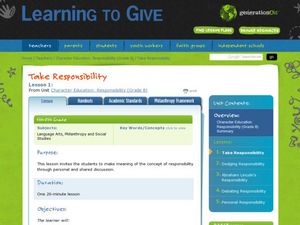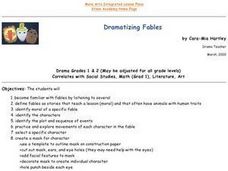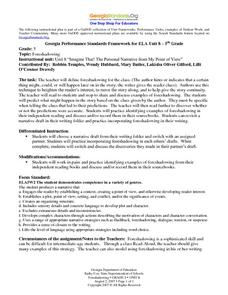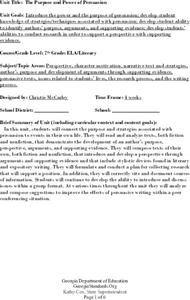Orange County Department of Education
Katie's Trunk
Fifth graders read the story of "Katie's Trunk". They identify the traits of integrity and fairness in the characters John Warren and Katie. Students explore how people can experience the same event but interpret it differently. They...
Curated OER
Stick Your Neck Out
Students research stories of teens who care using a website embedded in the lesson. In this character education lesson, students read about students who performed philanthropic acts and discuss the projects that most influenced them.
Curated OER
Take Responsibility
Young scholars examine the importance of responsibility. In this character education lesson plan, students participate in a group discussion to explore and define responsibility.
Curated OER
Persuasion
Middle schoolers read various stories and write reflections in their journals. Using the text, they identify the techniques the characters used in persuading the reader or other characters in the story.They rewrite a fairy tale from the...
Curated OER
Poems Put to Use
Students listen to sample poetry recitations. They discuss times when poetry might be used in real-life situations to move/motivate other people or audiences. They identify particularly moving passages and then quote them effectively to...
Curated OER
Dramatizing Fables
Students familiarize themselves with fables by listening to several of them. They define fables. They identify the moral of a specific fable. They identify characters, plot and sequence of events. They create a mask of a character in a...
Curated OER
Out of the Dust
Seventh graders read a book of poems called "Out of the Dust". In groups, they research the Dust Bowl and how it affected people living through the Great Depression. Using the text, they identify the theme and key turning points and...
Curated OER
Foreshadowing
Students read and discuss Act V, Scene 1. They define foreshadowing and identify examples of it from the text. They edit a partner's diary entry. They identify key ideas from the scene.
Curated OER
Literature Circles
Fourth graders work in groups in order to motivate one another to develop reading comprehension and literacy skills. The skills are built through the sharing of fine literature. They maintain a reading log to keep accountable for the...
Curated OER
Convincing Characters
Students create vivid, active characters for a story. In this character lesson, students discuss the characters in books they are familiar with. Students create a list of novels they have read and discuss the character types. Students...
Curated OER
Robin Hood: England's Man of Mystery
Students study the tale of Robin Hood to further their knowledge of character traits, improve their vocabularies, and increase their knowledge of the Medieval Ages. In this Robin Hood lesson, students complete 14 lessons that help them...
Curated OER
Editing the Conspiracy: Julius Caesar
Students practice close reading skills to edit the text of Julius Caesar as they read. They identify the features of the conspiracy. They discuss use of image of dark and light in the text.
Curated OER
Sam and the Lucky Money
Third graders read the story "Sam and the Lucky Money". Individually, they identify new key terms from the story. In groups, they examine the setting and discuss how it relates to the plots and characters. To end the lesson, they read...
Curated OER
Philanthropy - What Is It?
Students explore the meaning of the word philanthropy and identify examples of philanthropy in their home, school and community. They design a poster to communicate the meaning and impact of philanthropy.
Curated OER
Singing Along with the American Revolutionary War
Fifth graders read Chapter 12 in their social studies book, as well as trade books, and encyclopedias. They identify major events that took place during the American Revolutionary War. Students create a song (groups of 4-5 people) using...
Curated OER
Teaching Money
Students identify coin/money values, write amounts of money and calculate change. The poem, "Smart" by Shel Silverstein is used in this lesson.
Curated OER
Teaching Money
Young scholars identify the coins and bills used in the United States. They write the amounts of each bill and coin and practicing counting different amounts. They follow a demonstration about how to count money as well.
Curated OER
Nutrition 3: Got Broccoli?
Pupils discover why the human body needs food in order to survive. In groups, they analyze advertising for the foods they eat the most and try to identify the nutritional value of them as well. They complete a worksheet showing them...
Curated OER
Promoting Daily Fitness; Mini Game
Students evaluate human health by completing an interactive activity on the Internet. In this food choice lesson plan, students identify a list of foods which can make you unhealthy and sick compared to a list of nutritional ingredients....
Curated OER
The Amazon Rain Forest
Fifth graders perform a play about the Amazon Rain Forest. They practice assigned parts and sing a song about the Rain Forest. They create costumes for the characters and discuss the role each character plays. They perform the play...
Curated OER
Shakespeare's Othello and the Power of Language
Learners explore the basis of Iago's persuasive power by analyzing Shakespeare's use of rhetoric and figurative language. In this Othello lesson, students analyze Iago's rhetoric in monologues and dialogues with other characters....
Recorded Books
Teacher's Guide: The Pinballs
Dive your class into the novel The Pinballs by Betsy Byars with the support of this reading guide. Including short answer questions, a multiple choice comprehension quiz, and extension activities, a variety of materials are...
Curated OER
The Civil War: From Different Perspectives
Fifth graders look at the Civil War from different perspectives. In this Civil War lesson, 5th graders are divided into groups and take on the role of fictional characters with a real perspective that existed in the Civil War. They...
Curated OER
The Purpose and Power of Persuasion
Seventh graders are introduced to and discuss the power of persuasion. After reading text, they identify the author's purpose, perspective and argument. They write their own fiction and non-fiction texts and develop a perspective after...























